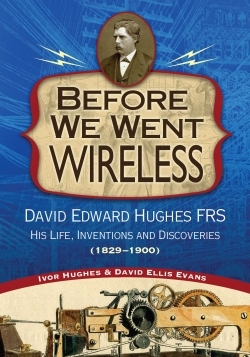
Before We Went Wireless
David Edward Hughes FRS, His Life, Inventions and Discoveries
- 2011 INDIES Finalist
- Finalist, Biography (Adult Nonfiction)
As David Ellis Evans and Ivor Hughes note, modern people live in a device-driven world. Most read, talk, research, and relax on computers and cell phones, oftentimes without ever wondering how this high tech world came to be so. Thanks to Evans and Hughes, Before We Went Wireless provides a thorough look into the ancestry of laptops, smartphones, and their ilk. “These technologies,” they write, “which we take for granted and on which we are so dependent, can be traced back to the pioneering work of Victorian scientists.”
One particular Victorian scientist, David Edward Hughes, improved upon Samuel Morse’s famous telegraph instrument, and worked as an early inventor of wireless and metal detection technologies. Before We Went Wireless serves as an extended biography of Hughes, “a man who ushered in the Communications Age.” Hughes’ inventions helped lead to the creation of present technologies, and as a result his biography makes for a compelling read, one that illuminates the foundation of the current state of communication.
Before We Went Wireless chronicles Hughes’ journey from beginning to end, focusing on both his life’s work and his life itself. Hughes, thought of as a “child prodigy,” improved upon the telegraph, effectively doubling the rate of words per minute spread across the wires. Around him worked the inventors of American legend—Thomas Edison, Samuel Morse, Alexander Graham Bell—as well as gifted physicists and scholars like the theoretical physicist James Clerk Maxwell. Despite his contributions to society, Hughes’ life and legacy are often overlooked in American history in favor of inventors like Morse, Edison, and Bell, and the authors note that Hughes “hitherto [this biography] has been something of an enigma.”
The book is as comprehensive as it is accessible. Evans and Hughes welcome readers into this biography with clear language and diagrams that aid in the theoretical underpinnings of Hughes’ inventions. While knowledge of Hughes and his work is absent from many Americans’ abbreviated understanding of the Communications Age, the authors hope their volume will redress that omission. Fellow historians, the authors met through an ancestor of the great inventor, and spent a decade compiling the thorough information contained in the text. Readers of this biography will learn both of Hughes and of the ancestry of their portable devices—knowledge crucial to understanding how, today, everyone stays in touch.
Reviewed by
Rachel Mennies
Disclosure: This article is not an endorsement, but a review. The publisher of this book provided free copies of the book to have their book reviewed by a professional reviewer. No fee was paid by the publisher for this review. Foreword Reviews only recommends books that we love. Foreword Magazine, Inc. is disclosing this in accordance with the Federal Trade Commission’s 16 CFR, Part 255.
